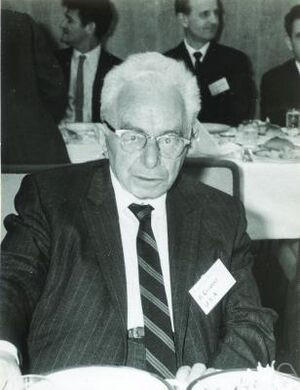Richard Courant (nonfiction): Difference between revisions
Jump to navigation
Jump to search
No edit summary |
No edit summary |
||
| Line 15: | Line 15: | ||
== Fiction cross-reference == | == Fiction cross-reference == | ||
* [[Gnomon algorithm]] | * [[Gnomon algorithm]] | ||
* [[Mathematics]] | |||
== Nonfiction cross-reference == | == Nonfiction cross-reference == | ||
* [[Herbert Busemann (nonfiction)]] - Doctoral student | |||
* [[William Feller (nonfiction)]] - Doctoral student | |||
* [[Kurt Friedrichs (nonfiction)]] - Doctoral student | |||
* [[David Hilbert (nonfiction)]] - Doctoral advisor | |||
* [[Fritz John (nonfiction)]] - Doctoral student | |||
* [[Joseph Keller (nonfiction)]] - Doctoral student | |||
* [[Edgar Krahn (nonfiction)]] - Doctoral student | |||
* [[Martin Kruskal (nonfiction)]] - Doctoral student | |||
* [[Anneli Lax (nonfiction)]] - Doctoral student | |||
* [[Hans Lewy (nonfiction)]] - Doctoral student | |||
* [[Mathematics (nonfiction)]] | * [[Mathematics (nonfiction)]] | ||
* [[Otto Neugebauer (nonfiction)]] - Doctoral student | |||
* [[Franz Rellich (nonfiction)]] - Doctoral student | |||
External links: | External links: | ||
Revision as of 22:30, 26 November 2017
Richard Courant (January 8, 1888 – January 27, 1972) was a German American mathematician.
He is best known by the general public for the book What is Mathematics?, co-written with Herbert Robbins.
Commenting upon his analysis of experimental results from in-laboratory soap film formations, Courant believed that the existence of a physical solution does not obviate mathematical proof:
Empirical evidence can never establish mathematical existence--nor can the mathematician's demand for existence be dismissed by the physicist as useless rigor. Only a mathematical existence proof can ensure that the mathematical description of a physical phenomenon is meaningful.
In the News
Fiction cross-reference
Nonfiction cross-reference
- Herbert Busemann (nonfiction) - Doctoral student
- William Feller (nonfiction) - Doctoral student
- Kurt Friedrichs (nonfiction) - Doctoral student
- David Hilbert (nonfiction) - Doctoral advisor
- Fritz John (nonfiction) - Doctoral student
- Joseph Keller (nonfiction) - Doctoral student
- Edgar Krahn (nonfiction) - Doctoral student
- Martin Kruskal (nonfiction) - Doctoral student
- Anneli Lax (nonfiction) - Doctoral student
- Hans Lewy (nonfiction) - Doctoral student
- Mathematics (nonfiction)
- Otto Neugebauer (nonfiction) - Doctoral student
- Franz Rellich (nonfiction) - Doctoral student
External links:
- Richard Courant @ Wikipedia
